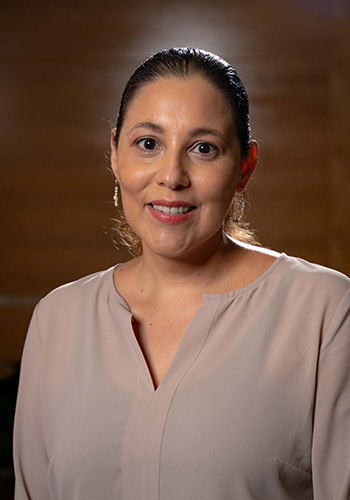Meet New Global Studies Prof Monserrat Bores Martínez
March 2, 2020

Degrees: MA in Spanish, The University of Western Ontario, Canada; PhD candidate in Spanish, The Pennsylvania State University
Research interests: Second language acquisition, language pedagogy, colonial Latin American literature, early modern Spanish literature
Hometown: San Luis Potosí, Mexico
Monserrat Bores Martínez is an assistant teaching professor in Drexel University’s Department of Global Studies and Modern Languages. In addition to her teaching and research, she previously served as a Fulbright faculty adviser at Princeton University, as co-director of the Puebla Education Abroad Program at Penn State University, and as a volunteer translator at a pediatric clinic.
What did you do before coming to Drexel?
I taught Spanish language and culture courses at Princeton University for nine years.
What is your favorite food or restaurant?
Mexican and Korean foods are my favorite, but I am always open to new flavors and restaurants.
When is the last time you did something “for the first time”? What was it?
Last Friday, I took a trolley for the first time in Philly. What a great experience!!!!!!
What/who inspires you?
Students inspire me to plan my classes, always having their interests and needs in mind. They challenge me every day, and they encourage me to give more than 100%. I feel very lucky to have the opportunity to share my time with such a vibrant and community engaged student and faculty body.
What did you want to be when you were a kid? What made you want to become a professor?
Since I am a first-generation university student, my aspiration as a kid was to be a secretary. Having access to a typewriter was a dream to me. This idea changed when I became aware that I was very comfortable and happy at school, with my classmates and professors. It was a safe space for me. Nowadays, I want my students to feel as comfortable as I was, and to be as engaged in my classes as I was as a student.
What was an impactful moment from your own college career?
Living in Canada as an international graduate student was very challenging for me. As a Mexican woman, I learned a lot about diversity and the importance of fighting not only for your own community, but also for others’ rights. In addition to that, I was amazed by the Canadian multicultural educational system, and by their respect for other cultures. Having professors and colleagues from different countries was a very enriching experience. It taught me the need to value and further appreciate my own origins and culture.
What do you consider to be your biggest achievement thus far in your career?
I have been very lucky in my career as a language instructor. For example, I designed a Spanish language, content-based course in Princeton University around two of the largest Spanish-speaking communities: Mexico and Los Angeles. Exploring Chilango and Chicano identities in the language classroom was a very enriching experience for my students, and for me. We were able to develop a better appreciation for Mexican and Mexican American traditions, cultural contributions, and daily struggles.
This course was not only a professional challenge, but also a personal one. Teaching about Mexican and Mexican American communities required developing a very critical perspective, doing a lot of research on different disciplines, and distancing myself from my own personal feelings and experiences. In the end, this course was a huge success, and became a model for other language courses. Student enrollment grew, and more students took Spanish courses outside of the language requirement. Some of them decided to concentrate or get a certificate in Spanish. As a language professor, this is one of my best achievements.